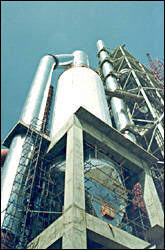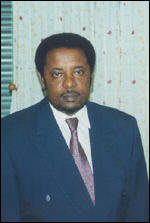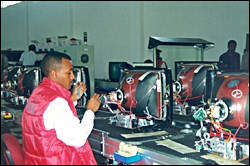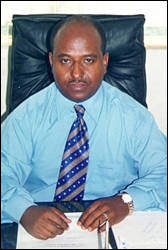 AMENDMENT ON TIME - TRADE AND INDUSTRY AMENDMENT ON TIME - TRADE AND INDUSTRY |

To emancipate the country from the bondage of poverty and under development, significant works have been done in many of the major economic sectors over the last few years.
The industrial and agricultural sectors of the economy in particular registered remarkable results after the introduction of a series of economic reform programs. This, in turn, has greatly contributed towards strengthening the export trade sector which had suffered serious set backs as a result of the Dergue's highly centralized economic policy.
The relevant strategy that Ethiopia is following to attain sustainable economic growth, equity, including regional equity and self reliance based on an industrial development strategy that makes extensive use of the country's natural base and locally available manpower on a sustained basis is the Agricultural Development Led Industrialization (ADLI) strategy.
ADLI strategy has facilitated the conducive implementation of export promotion strategy. Mr. Kassahun Ayele, Minister of Trade and Industry clarifies the main objectives of ADLI strategy. " The strategy of agricultural industrialization gives priority to agriculture and a gradual shift to industry and services. The center of all these activities then remains the exports of agricultural and industrial activities."

The export sector had been crippled during the 17 years of Dergue rule, leaving the country to suffer from serious foreign currency constraints.
Now however, the sector, the nation's main source of foreign exchange earnings, is making a steady recovery owing to the corrective measures taken to put the country's economy in proper shape. The fact that export trade has grown by 27 percent annually since 1994/95, is corroborative evidence. Today, Ethiopia is a land locked state. Ethiopia, which is a newly added country to the list of African land-locked countries, transits more than 97 percent of its foreign trade cargoes through foreign ports.
Due to the Ethio-Eritrean conflict, shipments of Ethiopian foreign trade cargoes have been concentrated from three parts (Assab, Massawa, and Djibouti) to Djibouti port only.
Mr. Kassahun Ayele expresses his opinion about the condition of the three ports Ethiopia has been using before the conflict, " The change of port to Djibouti, compared to the time we were able to use three ports, has not affected the situation. Eventhough we were using three ports eight months before, the magnitude of utilization of the Djibouti port had been very low. The Assab port belonged to Ethiopia and many importers had psychological attachment to this port. | When we started to use the Djibouti port we recognized that it had a big capacity. Currently, we have increased our imports and exports through one single port more than the accumulated results of the three ports. The Djibouti port has a high capacity and better equipment. Additionally, we have a very good relationship with the government of Djibouti."
 First on the new path First on the new path |
VESTEL a (Turkish company, worlwide leader in electronics) color television assembly plant, which is the first of its kind in Ethiopia, was recently established by an Ethiopian company named United Tebarek and Family plc. Mr. Tebarek Hassen, owner of United Tebarek and Family plc. has been importing VESTEL TV sets in Ethiopia for the past two years.

" I could not satisfy the market demand. Therefore, we must join with huge premise companies in the world like Vestel. Vestel is now the largest color television producer in the world under one roof.
No other company is producing 4 million color televisions under one roof " says Mr. Tebarek Hassen, General Manager of United Tebarek & Family. The plant assembles television sets, with components imported from Turkey.

The initial production capacity of the plant is 100 units per day, in an effort to satisfy the Demand of not only the Ethiopian market, but the Kenyan, Tanzanian and Zimbabwean markets as well. And the figure grows to 300 per day when the factory enters its second phase of production. Mr Tebarek says: " The population of Ethiopia is about 60 million, and until today there is not half million TVs sold in Ethiopia, so you can imagine the capacity and the size of the market. "
The demand of this product in Africa, will open new gates in business relations with Ethiopia and provide convenient access of the product to African consumers with the high expenses of transportation and other costs needed in importing hi-tec electronic equipment. Mr Tebarek adds: " I am the exclusive agent not only for Ethiopia, but also for East Africa with a total of seven countries. This includes Eritrea, Djibouti, Ethiopia, Somalia, Kenya, Uganda, and Sudan. Our future plan is to expand the capacity of production lines and to export for all African countries from Ethiopia." |

